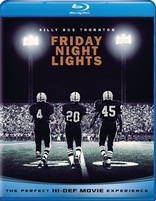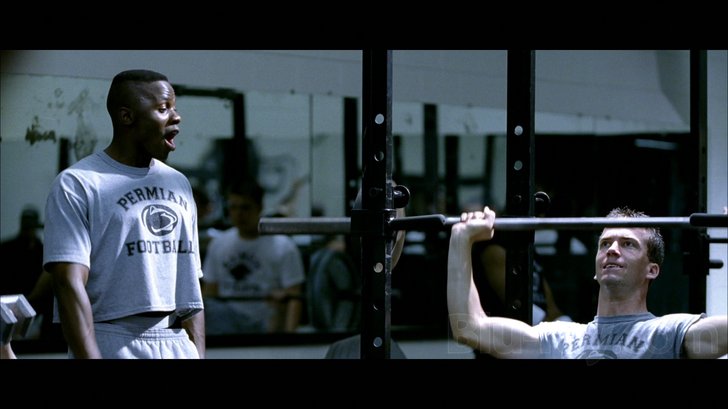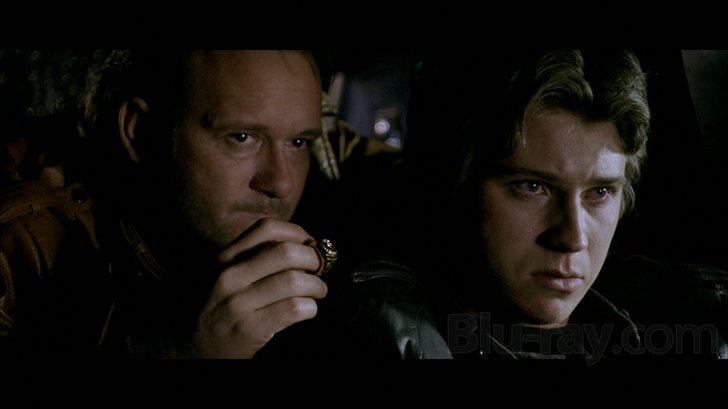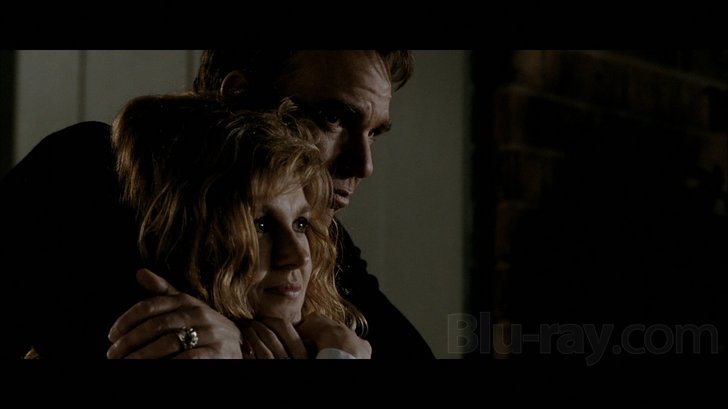Friday Night Lights Blu-ray Movie
HomeFriday Night Lights Blu-ray Movie 
Universal Studios | 2004 | 118 min | Rated PG-13 | Jan 06, 2009
Movie rating
7.3 | / 10 |
Blu-ray rating
| Users | 4.7 | |
| Reviewer | 4.5 | |
| Overall | 4.5 |
Overview
Friday Night Lights (2004)
The story of the 1988 Permian Panthers from Odessa, Texas, and their struggles, both on and off the football field, as they fight to win their sixth state championship.
Starring: Billy Bob Thornton, Lucas Black, Garrett Hedlund, Derek Luke, Jay HernandezDirector: Peter Berg
| Sport | Uncertain |
| Drama | Uncertain |
| Melodrama | Uncertain |
| Action | Uncertain |
Specifications
Video
Video codec: MPEG-4 AVC
Video resolution: 1080p
Aspect ratio: 2.35:1
Original aspect ratio: 2.39:1
Audio
English: DTS-HD Master Audio 5.1 (48kHz, 24-bit)
Spanish: DTS 5.1
French: DTS 5.1
Subtitles
English SDH, French, Spanish
Discs
50GB Blu-ray Disc
Single disc (1 BD)
BD-Live
Playback
Region free
Review
Rating summary
| Movie | 4.5 | |
| Video | 4.5 | |
| Audio | 4.5 | |
| Extras | 4.0 | |
| Overall | 4.5 |
Friday Night Lights Blu-ray Movie Review
Turf Warriors
Reviewed by Michael Reuben March 21, 2012Sports, and especially football, are often used as a metaphor for life, but I can't think of another film that so successfully captures the experience of life lived through sports as Peter Berg's Friday Night Lights, based on the 1990 bestseller by Buzz Bissinger. And not just the lives of the players on the Permian High School Panthers football team at the center of the story, but also of their families, their friends and the entire population of Odessa, Texas, whose hopes, dreams and very essence are so deeply invested in what happens on the playing field that the weekly Friday evening gatherings at Ratliff Field are, as many participants in the documentaries on this disc observe, as intensely spiritual as a religious ceremony. A writer for The Philadelphia Inquirer, Bissinger wrote his book with a journalist's eye. The portrait of Odessa that emerged wasn't entirely flattering, and for a time Bissinger was no longer welcome. But nearly fourteen years later, when the production company arrived to shoot the film, both the town and the national environment had changed. Director Berg, who had co-written the screenplay (and, as Bissinger's cousin, had the author's full support in streamlining the book for an effective film), chose to focus on an aspect of the story to which no true football fan could object: He wanted to depict the game as warfare, in which each team member behaved like a soldier, an individual but also part of a unit—and never off duty unless injury permanently removed him from the game (at which point, as far as the fans were concerned, his name might as well be on a memorial plaque).

The film follows the 1988 Permian Panthers' quest for the state championship from tryouts to their final game under the leadership of head coach Gary Gaines (Billy Bob Thornton, rock-solid and authentic). Several sharp turns occur along the path, some of which you can see coming, and some not. For the sake of first-time viewers, I'm limiting this feature description to a sketch of the main characters. If you don't know how the season unfolds, try to experience the film without anyone telling you beforehand. Coach Gaines holds the most visible and least enviable job in Odessa. Everyone has advice for him, and every decision he makes is second-guessed. He can't go to the mall with his wife, Sharon (Connie Britton), and daughter, Jennifer (Morgan Farris), without being accosted by local movers and shakers who don't hesitate to threaten dire consequences if the team loses the championship. Should a game go badly, the coach and his wife come home to a lawn littered with "for sale" signs (an incident that author Bissinger insists on the commentary track is not exaggerated). Gaines bears this constant onslaught with stoic resignation, as do Sharon and Jennifer. The only thing that fires the coach's emotions is the game itself. When his players aren't performing to their capacity, or the refs aren't making calls he considers fair, that's when Gaines flashes his ire. There's plenty to spare. The team's star is running back James "Boobie" Miles (Derek Luke), a fleet and agile motor-mouth described by everyone, except himself, as "cocky". Raised by his uncle, L.V. (Grover Coulson), Boobie is the town's hope and the school's idol. Colleges are recruiting him left and right, and no one seems to care that he barely attends class. His major, he blithely tells reporters, is football. With so much of the Panthers' strategy resting on one player, it doesn't take much foresight to predict that pride goeth before a fall, or that rival teams will focus all their attention on taking out the Panthers' most valuable player, whatever the cost. Mike Winchell is the quarterback; he's played by Thornton's former co-star, Lucas Black, from Sling Blade and All the Pretty Horses (which Thornton directed). Winchell is quiet, intense and can never relax and enjoy things. Boobie constantly ribs him for not smiling. No doubt much of Winchell's intensity comes from the responsibility of looking after his ailing mother (Connie Cooper), whose illness is never specified. Don Billingsley (Garret Hedlund of TRON: Legacy), a tailback, carries the burden of having a local legend for a father, Charles Billingsley (Tim McGraw), whose Panthers team won the championship when Charles attended Permian in the Sixties. Charles has lived off that early triumph ever since. His chief pursuits now are drinking and bullying his son for not living up to his memory. Brian Chavez (Alex Hernandez, Takers) plays tight end. He's the one with the grades, for which all of his teammates seem to envy him. When not on the field, he can usually be found in the company of Billingsley and Winchell. Ivory Christian, a linebacker and the biggest player on a team that runs toward the small side, is appropriately named, because he's devoutly religious. Until late in the film, he says almost nothing. The production couldn't find a suitable actor until, while casting extras to fill out the roster, second unit director Allan Graf discovered Lee Jackson, a former high school and college ball player. Chris Comer (Lee Thompson Young), whom Boobie calls "Waterbug", is the sole player among the main characters who isn't a senior. Like Boobie, he's a running back, but as the season begins, he's so used to sitting on the bench that, when Coach Gaines actually sends him in, he can't find his helmet. Comer will be more challenged as the season progresses and the increasing demands on the team force the coach to reach deeper into his bench. As these teenagers and the rest of their team deal with the enormous pressure of the expectations being heaped upon them, they develop relationships with each other that no outsider can fully understand (and of which Coach Gaines cannily takes advantage to push them past the point where they think they've given all they can). As co-writer and director, Berg is careful to tell his story through scenes that show the players as much as possible together with one another, both on the field and off, or with surrogates like Boobie's Uncle L.V., so that they always seem to be "in the game", like soldiers who are always with their comrades in spirit, even when they're on leave. It makes them all feel old before their time. As Chavez says at one point: "We got to lighten up. We're 17." To which Billingsley responds: "Do you feel 17?" And Winchell affirms: "I don't feel 17." Winchell doesn't have the roughest home life or experience the toughest breaks in Friday Night Lights, but he's the most thoughtful and introspective among the players we get to know best, and perhaps because, as quarterback, he also feels the burden of leadership, he's the one who first grasps the true nature of the adulation and attention that comes with being a football hero in a culture where football is everything. Riding home with Coach Gaines from a game, Winchell says he feels "cursed". The coach replies:
It took me a long time to realize that, uh, there ain't much difference between winnin' and losin', except for how the outside world treats you. But inside you, it's about all the same. It really is. Fact of the matter is, I believe that, uh, our only curses are the ones that are self-imposed. . . .We, all of us, dig our own holes.It's a key speech that says a lot about how Gaines keeps his equanimity while everyone in Odessa tells him how to do his job. Listen carefully to his locker room speeches, and you can hear him trying to impart some of that wisdom to his players. Their injuries on the field are minor compared to the turmoil they experience as they confront their own expectations and disappointments or those of family, friends and the community. By the end of the film, as the 1988 graduates go their separate ways, each of them will have to learn, in his own way, the profound truth of what Coach Gaines tried to tell them. Football isn't life; life is everything else that happens before and after. The players who fail to understand that end up like Billingsley, Sr., nursing the illusion that only a brief moment in their life was worth anything and taking it out on the people who love them because they couldn't stop time and stay in that moment forever.
Friday Night Lights Blu-ray Movie, Video Quality 

In his commentary, director Berg repeatedly thanks cinematographer Tobias Schliessler for his inventive cinematography for Friday Night Lights. (Schliessler would subsequently shoot Hancock for Berg and The Taking of Pelahm 1-2-3 for Tony Scott.) Much of the film was shot hand-held and in difficult lighting conditions, but Schliessler's imagery is always clear and detailed, allowing the viewer to both see and feel the action on the field. To complement the desolate and isolated Odessa locale, colors have been desaturated in post-processing (via a digital intermediate), although there is a subtle but distinct increase in color saturation as the film progresses and the Panthers' fortunes improve, so that by the time the team reaches Houston, the reds and greens in the Astrodome are vivid and bright. Universal's 1080p, AVC-encoded Blu-ray was presumably sourced from the DI, and whatever complaints are typically voiced about Universal's handling of their catalogue fare, there should be none about Friday Night Lights, which could hardly have looked better on a release print. Black levels, contrast and shadow detail are exemplary, and colors chart the appropriate course from washed-out to intense. As is commonly the case for DI-finished productions, film grain is well-controlled, but it remains readily visible due to the high-contrast style of the photography. There is some minor aliasing and video noise on fine patterns in long shots, usually aerial establishing views; however, these come and go quickly, and you might not even notice if you're not looking for them. (I see such visual hiccups more and more often in theatrical exhibition.) Considerations of high frequency filtering and artificial sharpening have become irrelevant where a DI is involved. Compression artifacts were non-existent.
Friday Night Lights Blu-ray Movie, Audio Quality 

The DTS-HD MA 5.1 track for Friday Night Lights is immersive and powerful during the game sequences. It puts you on the field in the midst of the scrimmage surrounded by the roaring crowd, and the tackles, blocks and body blows have real impact. The track is as impressive for its restraint as for its "punch". It would be easy and tempting to ramp up the sound of these physical encounters to the point of near-parody, so that the result would resemble something like a wrestling exhibition or a Sylvester Stallone film, but Berg and his mixers resisted that temptation. These encounters sound real, which gives them that much more impact. The dialogue is always clear and intelligible—again, no small achievement given the wide array of voices, accents, speaking styles and emotional pitches on display (Thornton alone ranges from muttered resignation to bellowing rage). The score is by the band Explosions in the Sky, with additional contributions by Brian Reitzell and David Torn, and it's notable for going against the grain of the rousing tones one expects from a sports movie (as in, for examples, Hoosiers). The music is energetic when appropriate, but it can also be downbeat, moody and elegiac: an ideal complement to a deceptively complex film.
Friday Night Lights Blu-ray Movie, Special Features and Extras 

- Commentary with Director Peter Berg and Writer Buzz Bissinger: The two cousins, Berg and Bissinger, chat amiably and continuously. Bissinger focuses primarily on his experiences accompanying the Panthers during the 1988 season as research for his book, and he comments favorably on the degree to which the cast captured the essence of their characters. He also discusses what had to be changed in the translation from page to screen and responds bluntly to some of the criticisms leveled against the film; he's especially scathing about claims that the film "didn't deal" with issues of racism. As one would expect from a director, Berg focuses on an array of technical issues, including cinematography, editing and acting issues; one gets the strong sense that much of his "directing" was accomplished at the screenwriting stage, and that his own faith in the material allowed him to trust his cast and crew to bring their best efforts to realizing it.
- Action-Packed Deleted Scenes (SD; 2.35:1, non-enhanced; 21:48): There are ten scenes, of which many are extended versions of scenes in the finished film. The most interesting deletion is a minor digression that would have seen the Dallas Carter team temporarily disqualified from competition due to grading irregularities. Based on events that occurred after those portrayed in the film, this sequence was no doubt removed (appropriately) as an unnecessary distraction.
- Peter Berg Discusses a Scene in the Movie (SD; 2.35:1, non-enhanced; 1:09): Berg discusses the burger joint scene that was added to the film's opening section after the studio saw a rough cut. Following Berg's comments, the scene plays in excerpt from the main feature.
- Player Cam (SD; 1.33:1; 4:19): Ryan Jacobs, who portrays one of the players, takes his video camera behind the scenes. (Jacobs also appears in the "Gridiron Grads" feature.)
- Tim McGraw: Off the Stage (SD; 1.33:1; 6:11): Interviews with McGraw, Berg, Hedlund, Thornton and producer Brian Grazer on how the country star took on the unsympathetic role of Charles Billingsley.
- The Story of the 1988 Permian Panthers (SD; 1.33:1; 23:32): Replete with interviews with the real individuals portrayed in the film, including James "Boobie" Miles, Don Billingsley, Mike Winchell and Brian Chavez, this documentary provides a fascinating perspective on the historical events.
- Gridiron Grads (SD; 1.33:1; 14:11): Recruiting and training the extras to fill out the various football teams.
- Behind the Lights (SD; 1.33:1; 26:51): Extensive interviews with Berg, Grazer, Bissinger, cast and crew members and members of the 1988 Permian team chart the history of the film's production. The theme that emerges most strongly is the weight of responsibility that those making the film felt to create something that the people they were portraying could be proud of.
- My Scenes
- BD-Live
Friday Night Lights Blu-ray Movie, Overall Score and Recommendation 

In 2002, Sports Illustrated named Bissinger's book the fourth greatest ever written about sports. I don't know whether a similar ranking has ever been done for sports films, but Friday Night Lights belongs near the top. It achieves authenticity in its portrayal of the sport while creating distinctive and memorable characters and vivid drama that can engage even viewers who have no interest in football. (My wife watched the entire film with me for this review and was never bored.) Good films leave you with the sense that you've seen both the nitty-gritty details and the most basic truths. That how you feel when the credits roll on Friday Night Lights. Highly recommended.
Other editions
Friday Night Lights: Other Editions
Similar titles
Similar titles you might also like

The Express
2008

Remember the Titans
2000

Rudy
1993

Friday Night Lights: The Complete Series
2006-2011

We Are Marshall
2006

When the Game Stands Tall
2014

Draft Day
2014

Gridiron Gang
2006

The Program
1993

Coach Carter
2005

School Ties
1992

Touchback
2011

Hoosiers
25th Anniversary Edition
1986

My All American
2015

Glory Road
2006

Any Given Sunday
15th Anniversary Edition | Director's Cut | Includes Theatrical Cut DVD
1999

Forever Strong
2008

Run the Race
2019

Annapolis
2006

American Underdog
2021

